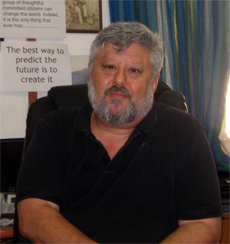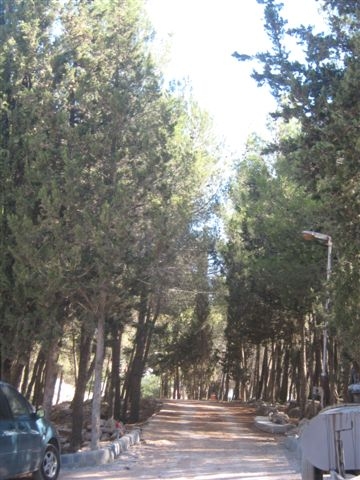
George Mitchell

Gershon Baskin
photo by Rhonda Spivak

The hills surrounding Beit Jalla in the West Bank
Photo by Rhonda Spivak

Location of the conference in Beit Jalla
Photo by Rhonda Spivak
George Mitchell resigned last week as Obama’s Special Envoy to the Middle East, with little fan fare.
The Obama administration said he never intended to stay on for more than two years, but surely if he had thought he was anywhere near close to reaching a deal he would have continued. Mitchell’s resignation is a sign that that both he and Obama know little if anything has been accomplished under Mitchell’s term.(Obama referred to Mitchell’s contribution as “immeasurable” and critics say it is exactly that!)
When George Mitchell was appointed by Obama as his Special Middle East Envoy and there was great media hype about how he would be able to accomplish things that no one else up to then had been able to accomplish in brokering a deal between Israelis and Palestinians, I was deeply skeptical. I told dovish Israeli friends and journalists in August 2009, that I did not think Mitchell would succeed.
The reason I said this was based on my own personal experience in that I had spent two days at a peace conference put on by the Israeli-Palestinian Centre for Research and Information in August 2009. There I had met average Palestinians who came to the conference because they were committed to dialogue and non-violence presumably.
But at the conference, the gaps were very wide between the Palestinians and Jewish Israelis regarding the right of return and a two state solution. Virtually all of the Palestinians I spoke at the conference to wanted “one state” (meaning a Palestinian majority and no Jewish state of Israel), and they did not want to compromise on the right of return. Presumably, these Palestinians were at the conference because they were supposed to be the more moderate of Palestinian society-and if that were the case, I did not see how a deal could be possible.
The left-wing Jewish Israelis at the conference were all speaking of a two state solution and willing to give the Palestinians a state in the West Bank and Gaza with East Jerusalem as their capital-and were willing to uproot some Jewish settlements if need be, with the hopes that there would be land swaps to incorporate the larger settlement blocks. The Jewish Israelis at the conference were all against the building of new settlements or even “natural growth” of settlements. Notwithstanding this, the Palestinians still spoke of wanting a one state solution instead of a two state solution. They also were uncompromising on the right of return insisting that Palestinian refugees could return en mass to flood Israel and erode its Jewish majority. (The Palestinian position regarding the right of return explains why all those I spoke with all supported a “one state “ solution).
I went away form the conference thinking that If hard core left-wing Israelis (like Gershon Baskin) and Palestinians committed to non-violence could not come close to a deal at a conference such as this, I did not see any bilateral agreement on the horizon–whether or not George Mitchell was injected into the formula..
When I returned form the conference, I started wondering why there were no Palestinians who seemed willing to take the position that the right of return would be to the future state of Palestine only (or even mostly to a future Palestinian state), and that compensation would be offered instead to Palestinian refugees. It was something that the left-wing Israeli NGO types talked about at the conference, and yet I had never heard this uttered out of the mouth of one Palestinian at the conference. I began to think that presumably, if such Palestinians existed to any significant degree in the Palestinian body politic, I would have found one two of them at the conference.
I believe that if George Mitchell had gone “under cover” and had been at that conference, he would have instinctively understood that he was going to fail in his mission.
Below is the piece that I wrote shortly after returning form that conference-which I believe, unfortunately, has stood the test of time very well.
WHEN PEACE SEEMS FURTHER THAN CLOSER
By Rhonda Spivak, August 2009
In Beit Jallah, just outside of Bethlehem, a group of Israelis and Palestinians met at a conference last month sponsored by the Israel-Palestinian Centre for Research and Information [IPCRI], an organization promoting tolerance, co-existence and compromise. But even there, the gaps between the parties were so glaring, that it is virtually impossible to see how a peace plan could ever be enacted on the ground between the Palestinian Authority which governs the West Bank and the government of Israel.
At the conference, Osama Alhrithi, a fourth year law student at Al-Quds University in Jerusalem said he believes that even if Israel went back to the 1967 green line and all Jewish settlements over the green line were removed, “any Palestinian refugee who wants to return to his home that he left in 1948 in Israel should be able to come back…There are a lot of Palestinian refugees in Jordan and Lebanon and if they want to come back, that is their holy right.”
Alhrithi’s view about Israel being obliged to take in waves of Palestinian refugees, rather than those refugees returning to a future Palestinian state only, was typical. It was one echoed by virtually all of the Palestinian delegates to the conference, even though these delegates were affiliated with Fatah, not Hamas, which now rules the Gaza Strip. However, for all of the Israeli Jews present at the conference, it was inconceivable to let Palestinian refugees return en masse and overtake their country.
At the end of the conference Gershon Baskin, the dovish Israeli co-CEO of IPCRI spoke in favor of establishing a Palestinian state in the West Bank and Gaza strip with East Jerusalem as the Palestinian capital. However, he said what all of the moderate Israelis say, which is that Palestinian refugees will be able to go to the Palestinian state only, and not back to pre-67 Israel, or they will be given monetary compensation instead. When Baskin said this, he was challenged by Ra’id Abdalla Otair, director of the Palestinian Authority’s Ministry of Health in Hebron. “All refugees in Syria, Jordan, Lebanon, and elsewhere should be asked to come back to their land in Israel-in Haifa, and Jaffa and Akko,” Ra’id shouted.
Baskin shouted back, “No Ra’id-you can’t live under that illusion any more–Israel can’t be overrun with Palestinian refugees, because then there will be two Palestinian states, and no Jewish state…I don’t want to occupy you Ra’id, but Israel won’t allow itself to become a Palestinian state.” After Baskin’s response, Ra’id, who is also the Palestinian representative for the NGO Future Vision, stormed out of the room. During the conference Ra’id had told me he had been jailed by Israel for throwing rock in the intifada.
Ra’id, and the other Palestinians who spoke out at the conference, also ruled out the possibility of “land swaps” in any peace agreement. They maintained that Israel would have to withdraw exactly to the 1967 lines, eliminating the possibility that it could retain large Jewish settlement blocs, comprising about 4% of the West Bank, in exchange for giving the Palestinians the same amount of land elsewhere, such as in the Negev. For the Israelis present, including Baskin, land swaps would have to be part of the deal.
As Firas Arafat, a pharmacist from Hebron said, “I know Jimmy Carter just came to the Gush Etzion Jewish settlement area [over the 1967 green line] and told the Jews there that they would remain part of Israel in the future, but I don’t agree. Israel must get out of every Jewish settlement in the occupied territories.”
Other Palestinians, such as Mazin Qumsiyeh, a scientist at Bethlehem University, spoke of a “a one state solution” for all people between the Mediterranean Sea and Jordan River- a state that would have a Palestinian majority. When confronted with the fact that that there was no support for this proposal among Israeli Jews, Qumsiyeh said, “So what?…“Twenty years ago Israelis didn’t recognize such things as a Palestinian state……but that changed…As a scientist [I think] that a one state solution has a 1000 times more probability of happening… than a two state solution.”
At the end the conference, as Baskin advocated an “internationally imposed solution”, since he has lost hope of a negotiated peace, I went away with the feeling that peace has never seemed further.
Finally, when I left the conference, I begun to notice that a number of the Palestinians at the conference seemed to work for the Palestinian Authority, and I began to wonder if the reason they were even at the conference was because they were being paid by the PA to attend-in order to fill the seats on the Palestinian side.









